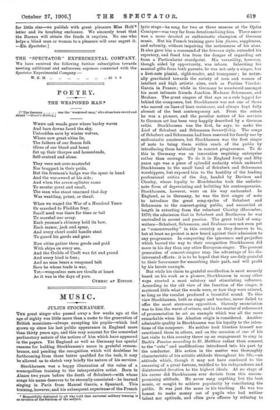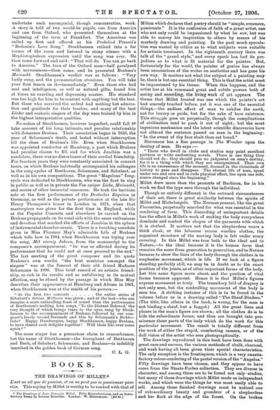MUSI C.
JULIUS STOCKHAUSEN.
THE great singer who passed away a few weeks ago at the age of eighty was little more than a nathe to the generation of British musicians—always excepting his pupils—which had grown up since his last public appearance in England more than thirty years ago, and this may account for the somewhat perfunctory nature of the notices of him which have appeared in the papers. Yet England as well as Germany has special reasons for holding Stockhausen's name in grateful remem- brance, and pending the recognition which will doubtless be forthcoming from those better qualified for the task, it may be allowed as to sketch very briefly the nature of his services.
Stockhausen was a happy illustration of the value of a cosmopolitan training to the interpretative artist. Born in Alsace two years before the death of Schubert—with whose songs his name deserves to be eternally associated—he learned singing in Paris from Manuel Garcia, a Spaniard. This training, however, and his subsequent experience of the French
• Respectfully dedicated to all who hold that universal military training is ai 'swish= of the freedom of the subject.
lyric stage—he sang for two or three seasons at the Opera Comique—was very far from denationalising him. There never was a more devoted or enthusiastic champion of German music. But his French training gave him finesse, suppleness, and urbanity, without impairing the seriousness of his aims. It also gave him a command of the bravura style, extended his repertory, and freed him from the danger of regarding art from a Particularist standpoint. His versatility, however, though aided by opportunity, was inborn. Inheriting his musical gifts from both parents, he was not only a singer, but a first-rate pianist, sight-reader, and transposer ; he natur- ally gravitated towards the society of men and women of intellect and high artistic aims, such as Pauline Viardot- Garcia in France ; while in Germany he numbered amongst his most intimate friends Joachim, Madame Schumann, and Brahma. The great singers of that age as a rule lagged far behind the composers, but Stockhausen was not one of those who moved on lines of least resistance, and always kept fully abreast of the beat contemporary art. From the outset he was a pioneer, and the peculiar nature of his services to German art has been very happily described by a German critic. Stockhausen was the first, he says, to make the Lied of Schubert and Schumann konzertfahig. The songs of Schubert and Schumann had been reserved for family use by enthusiastic amateurs, but Stockhausen was the first singer of note to bring them within reach of the public by introducing them habitually in concert programmes. To dc this in Germany was an innovation requiring enterprise rather than courage. To do it in England forty and fifty years ago was a piece of splendid audacity which endeared Stockhausen to the small band of Schubert and Schumann worshippers, but exposed him to the hostility of the leading professional critics of the day, headed by Davison and Chorley, whose loyalty to Mendelssohn took the unfortu- nate form of depreciating and belittling his contemporaries. Stockhausen, however, went on his way undaunted. In England, as in Germany, he was the first singer of note to introduce the great song-cycles of Schubert and Schumann to the concert-going public, and succeeded at length in extorting from the reluctant Chorley (December, 1870) the admission that in Schubert and Beethoven ho was unrivalled in accent and passion. The great triad of song- writers—Schubert, Schumann, and Brahms—are not even yet as " concertworthy " in this country as they deserve to be, but at least no protest is now heard against their admission to any programme. In conquering the ignorance and prejudice which barred the way to their recognition Stockhausen did more in his day than any other European singer. The present generation of concert-singers reap the advantage of his dis- interested efforts : it is to be hoped that they are duly grateful to their forerunner for smoothing their path, and will profit by his heroic example.
But while his claim to grateful recollection is most securely based on his work as a pioneer, Stockhausen in many other ways exerted a most salutary and stimulating influence. According to the old view of the function of the singer, it mattered little what the words were, or how they were uttered, so long as the vocalist produced a beautiful sound. To this view Stockhausen, both as singer and teacher, never failed to offer the most strenuous opposition. Slovenly enunciation was to him the worst of crimes, and in the matter of refinement of pronunciation he set an example which was all the more remarkable when his Alsatian origin is considered. Another admirable quality in Stockhausen was his loyalty to the inten- tions of the composer. He neither took liberties himself nor sanctioned them-in others, and on the occasion of one of his last visits to this country threw up an engagement to sing in Bach's Passion according to St. Matthew rather than consent to the "cats" and modifications introduced into his part by the conductor. His action in the matter was thoroughly characteristic of his artistic attitude throughout his life,—an attitude which, though it may not have conduced to the amassing of a great fortune, testified to his independence and disinterested devotion to the highest ideals. At no stage of his career did Stockhausen ever deviate from this uncom- promising attitude. He never sang anything but the best music, or sought to achieve popularity by conciliating the public. It was just the same in his teaching. He was too honest to make money oat of pupils who had neither talent nor aptitude, and often gave offence by refusing to
undertake such uncongenial, though remunerative, work. A story is told of two would-be pupils, one from America and one from Oxford, who presented themselves at the beginning of the term at Frankfort. The American was called up first and offered as his Probelied Pinsuti's
" Bedouin's Love Song." Stockhausen retired into a far corner of the room and listened in stony silence with a Mephistophelean expression until the song was over. He then came forward and said : " That will do. You can go back to America." The turn of the Oxford man—half paralysed with nervousness—then came, and be presented Brahms's Mainacht. Stockhausen's verdict was as follows : " Very badly sung, and the pronunciation atrocious. You will take your first lesson on it—immediately." Even those who had zeal and intelligence, as well as natural gifts, found him at times an exacting and depressing master. His standard was too high for him to be content with anything but the best. But those who survived the ordeal had nothing but admira- tion and gratitude for their teacher, and many of the best Lieder and oratorio singers of the day were trained by him in the highest interpretative qualities.
No notice of Stockhausen, however imperfect, could fail to take account of his long, intimate, and peculiar relationship with Johannes Brahma. Their association began in 1856, the year of Schumann's death, and lasted without interruption till the close of Brahms's life. Even when Stockhausen was appointed conductor at Hamburg, a post which Brahma bad peculiar claims to fill, and for which Joachim was a candidate, there was no disturbance of their cordial friendship. For fourteen years they were constantly associated in concert tours, on which Brahms habitually accompanied his colleague
in the song-cycles of Beethoven, Schumann, and Schubert, as well as in his own compositions. The great "Magelone" tong-
cycle was dedicated to Stockhausen, who was the first to sing in public as well as in private the Von etviger Liebe, Mainacht, and scores of other immortal romances. He took the baritone solo at the first performance of the Deutsches Requiem in Germany, as well as the private performance at the late Sir Henry Thompson's house in London in 1871, when that masterpiece was given for the first time in England, while at the Popular Concerts and elsewhere be carried on the Brahms propaganda on its vocal side with the same enthusiasm and devotion that marked the efforts of Joachim in the sphere of instrumental chamber-music. There is a touching anecdote given in Miss Florence May's admirable Life of Brahms which tells bow in 1884, when Stockhausen was trying over the song, Mit vierzig Jahren, from the manuscript to the composer's accompaniment, " he was so affected during its performance that he could not at once proceed to the end." The last meeting of the great composer and (to quote Brahms's own words) "the best musician amongst the singers" was at the funeral of their old friend Madame Schumann in 1896. This brief record of an artistic friend- ship, so rich in its results and so unfaltering in its mutual
affection, may be closed by the passage in -which Miss May describes their appearances at Hamburg and Altona in 1861, when Stockhausen was at the zenith of his powers :— "At the first two concerts the entire series of Schubert's &hone Mullerin was given ; and at the last—who can imagine a more enthralling feast of sound than the performance of Beethoven's melting love songs, To the Distant Beloved,' the very thought of which brings tears to the eyes, sung by Stock- hausen to the accompaniment of Brahms, followed by our com poser's lovely second Serenade and this by Schumann's Dichter- liebe? Happy Hamburgers, happy Stockhausen, happy Brahms, to have shared such delights together ! Will their like ever come again ?"
The mere singer has a precarious claim to remembrance, but the name of Stockhausen—the bierophant of Beethoven and Bach, of Schubert, Schumann, and Brahms—is indelibly inscribed in the golden book of German song. C. L. G.















































 Previous page
Previous page